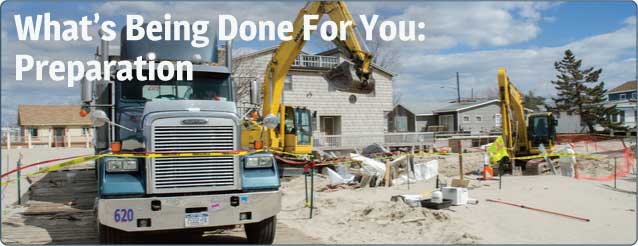
Photo Credit: Federal Emergency Management Agency
When Rules Are Cool
Don’t be afraid to call your local, state or federal agencies for information about what to do in the event of a major storm. Don’t be shy. Don’t get all macho and vow to tough it out. Pick up the phone, call and ask them. They are nice — and knowledgeable — folks. But it would be best to do it in advance, rather than when that Big Bad Wolf is huffing and puffing at your door. Once a storm event is here, they have to turn their attention to the most immediate needs, which is where triage comes in — remember all those TV shows with doctors or firemen making tough choices over who gets help first. And don’t be one of those people who puts yourself at risk because you failed to make provisions for Fido or Fluffy and risk dangerous conditions versus abandoning a beloved pet. Better to have your questions ready in advance when you can move to the head of the line.
- The Rhode Island Department of Transportation, Department of Health, and Division of Planning are working on numerous initiatives addressing climate change impacts in the state of Rhode Island. As these initiatives and programs continue, the state will develop a better understanding of its risks and vulnerabilities and can start considering adaptive planning strategies.
- The Rhode Island Emergency Management Agency is working to help protect life and property during disasters and crisis situations through active mitigation, preparedness, response, and recovery programs. RIEMA’s hazard preparation and risk mitigation programs and trainings are valuable resources for communities and the broader public.
- The Office of Emergency Response at the Department of Environmental Management is also involved in state-level preparation and post-disaster response and recovery.
- Preparing pets for evacuation has been well considered by the RI Department of Environmental Management.
“Man is not the creature of circumstances, circumstances are the creature of man. We are free agents, and man is more powerful than matter.’
- Benjamin Disraeli
News
Factoids
Preparation costs average between $0.5 and $1.0M per mile of shoreline warned about hurricanes on the Atlantic Coast. On average, warnings extend 300-400 miles and are raised three times each season. On average, that is over $750 million dollars a year.
The Centers for Disease Control and Prevention awarded Rhode Island a $250,000 grant to help the state prepare for health effects associated with climate change.
Wastewater treatment upgrades are being made in Rhode Island to accommodate overflow during high rain events — something we are going to see more of in the future. In 2012, approximately 4.6 billion gallons of water that would have previously flowed directly into Narragansett Bay was captured and treated.




